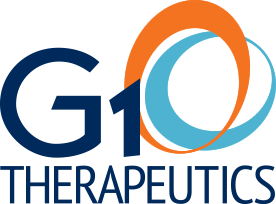
G1 Therapeutics Reports Positive Results for Cancer Therapy

G1 Therapeutics, a clinical-stage oncology company based in Research Triangle Park, has reported positive top-line data from a Phase 2a trial of trilaciclib, its potential therapy for patients who are taking chemotherapy for small-cell lung cancer.
Trilaciclib is intended to protect bone marrow cells – known as myelopreservation – and immune system function during chemotherapy.
“The data from this trial showed clear evidence that trilaciclib preserved bone marrow and immune system function from the damaging effects of chemotherapy,” Raj Malik, M.D., G1’s chief medical officer and senior vice president of R&D, said in a news release. “Moreover, the myelopreservation effects demonstrated by trilaciclib improved patient outcomes.”
Trilaciclib was well tolerated, with no Grade 3 or 4 adverse events reported, Malik said in a follow-up webcast for investors.
Trilaciclib is a potential first-in-class, short-acting inhibitor of CDK4 and CDK6, two enzymes involved in cancer formation. Inhibiting these proteins temporarily stops hematopoietic stem cells and progenitor cells from dividing, making them resistant to damage from chemotherapy drugs that target dividing cells.
The double-blind, placebo-controlled trial involved 75 patients with extensive-stage small-cell lung cancer. About half of them were given trilaciclib and half placebo before receiving each dose of the standard chemotherapy drugs etoposide and carboplatin.
In addition to protecting multiple hematopoietic cell lines, trilaciclib showed favorable trends versus placebo for overall response rate, duration of response and progression-free survival, G1 reported.
“The strength of this dataset provides us with a solid foundation to advance the development of trilaciclib and its ultimate commercialization,” said Mark Velleca, M.D., Ph.D., G1’s chief executive officer. “We believe that trilaciclib has the potential to become backbone therapy for multiple chemotherapeutic regimens across a variety of cancer types, delivering significant benefits to patients and creating a substantial long-term commercial opportunity.”
More than 1 million cancer patients take chemotherapy annually in the United States, Velleca said.
“A major drawback of chemotherapy is the damage that it does to the bone marrow, which is the reservoir from which all blood and immune cells are formed,” he said. Patients suffering from bone marrow suppression often require blood transfusions and growth factors.
“There are significant limitations to these salvage therapies, and they only support single blood lineages,” Velleca said. “Our goal is to give patients a new, much better option, trilaciclib, which can preserve all blood cell lineages – neutrophils, red cells, platelets and lymphocytes.”
Compared to the placebo group, patients receiving trilaciclib had fewer cases of grade 3 anemia (low red blood cells), thrombocytopenia (low platelets) and neutropenia (low neutrophils, a type of white blood cell).
“We’re obviously thrilled that we see some very positive data across all (blood cell) lineages, which really is why this is compelling proof-of-concept data,” Malik said.
Patients receiving trilaciclib also required fewer red blood cell transfusions and growth factor treatments and experienced fewer delays and dose reductions in their chemo treatments.
Velleca said G1 would share the trial data with U.S. and European regulatory authorities this year, “well ahead of our initial timeline,” and discuss next steps for the development of trilaciclib.
G1 is conducting two other clinical trials of trilaciclib to assess myelopreservation in second- and third-line small cell lung cancer and first-, second- and third-line triple-negative breast cancer. Preliminary data from both trials are expected in the fourth quarter of 2018.
Meanwhile, trilaciclib’s effect on overall survival is being evaluated in a Phase 2a trial in first-line, extensive-stage small-cell lung cancer as part of a combination regimen with carboplatin, etoposide and Tecentriq, a cancer immunotherapy drug marketed by Genentech. Enrollment of that trial was completed in February.
“We will continue to explore ways to broaden use of trilaciclib across multiple tumors with the ultimate goal of using trilaciclib in a ‘chemo-agnostic’ way that could make it backbone therapy for multiple chemotherapy regimens,” Velleca said.
In addition to trilaciclib, G1 is advancing G1T48, a potential first-in-class oral selective estrogen receptor degrader for treating estrogen-receptor-positive breast cancer.
G1, a 2008 spin-out of the University of North Carolina at Chapel Hill, “is a 10-year overnight success story,” Velleca said in a presentation at last week’s CED Life Science Conference in Raleigh.
The company raised $108 million in an initial public offering of stock in 2017 after raising more than $95 million in three rounds of venture capital funding. The North Carolina Biotechnology Center provided two early stage loans totaling $500,000 that Velleca said were “crucial” to positioning G1 for its follow-on funding.
G1 is developing novel cancer therapies for breast, lung and other cancers and has more than 115 U.S. and international patents and pending-patent applications.
The company is named for the Gap 1 phase, the first of four phases of cell division in humans, plants and animals.
